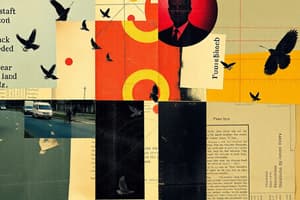Podcast
Questions and Answers
Mores are norms that are widely observed and have great ______ significance.
Mores are norms that are widely observed and have great ______ significance.
moral
Folkways are norms for routine, casual ______.
Folkways are norms for routine, casual ______.
interaction
If you fail to practice folkways, some may have a little ______ about it, but not that intense compared to disobeying mores.
If you fail to practice folkways, some may have a little ______ about it, but not that intense compared to disobeying mores.
disgust
Material culture reflects a society’s ______.
Material culture reflects a society’s ______.
The Elements of Culture: Although cultures vary, they all have five common components: (1) Symbols=Although cultures vary, they all have five common components: (2) ________
The Elements of Culture: Although cultures vary, they all have five common components: (1) Symbols=Although cultures vary, they all have five common components: (2) ________
The Elements of Culture: 2.1) Elements of Culture Language ⬧ Cultural transmission (Oral traditions) – the process by which one generation passes culture to the next.⬧ Every society transmits culture through ________.
The Elements of Culture: 2.1) Elements of Culture Language ⬧ Cultural transmission (Oral traditions) – the process by which one generation passes culture to the next.⬧ Every society transmits culture through ________.
The Elements of Culture: (2.2) The Sapir-Whorf Thesis Languages are not just different sets of labels for the same reality. All languages fuse symbols with distinctive emotions. The Sapir-Whorf Thesis – people perceive the world through the cultural lens of ________.
The Elements of Culture: (2.2) The Sapir-Whorf Thesis Languages are not just different sets of labels for the same reality. All languages fuse symbols with distinctive emotions. The Sapir-Whorf Thesis – people perceive the world through the cultural lens of ________.
The Elements of Culture: (3) Values and Beliefs = Values are culturally defined standards by which people assess desirability, goodness, and beauty and that serve as broad guidelines for social living. Values are abstract standards of ________.
The Elements of Culture: (3) Values and Beliefs = Values are culturally defined standards by which people assess desirability, goodness, and beauty and that serve as broad guidelines for social living. Values are abstract standards of ________.
Flashcards are hidden until you start studying
Study Notes
Elements of Culture
- Mores are norms that are widely observed and have great moral significance.
- Folkways are norms for routine, casual behavior, and failing to practice them may lead to mild disapproval.
- Material culture reflects a society's values and beliefs.
Language
- Language is a key component of culture, and every society transmits culture through language.
- Cultural transmission occurs through oral traditions, where one generation passes culture to the next.
Sapir-Whorf Thesis
- The Sapir-Whorf Thesis states that languages are not just different sets of labels for the same reality, but rather they fuse symbols with distinctive emotions.
- People perceive the world through the cultural lens of their language.
Values and Beliefs
- Values are culturally defined standards by which people assess desirability, goodness, and beauty.
- Values serve as broad guidelines for social living and are abstract standards of goodness and morality.
Studying That Suits You
Use AI to generate personalized quizzes and flashcards to suit your learning preferences.




